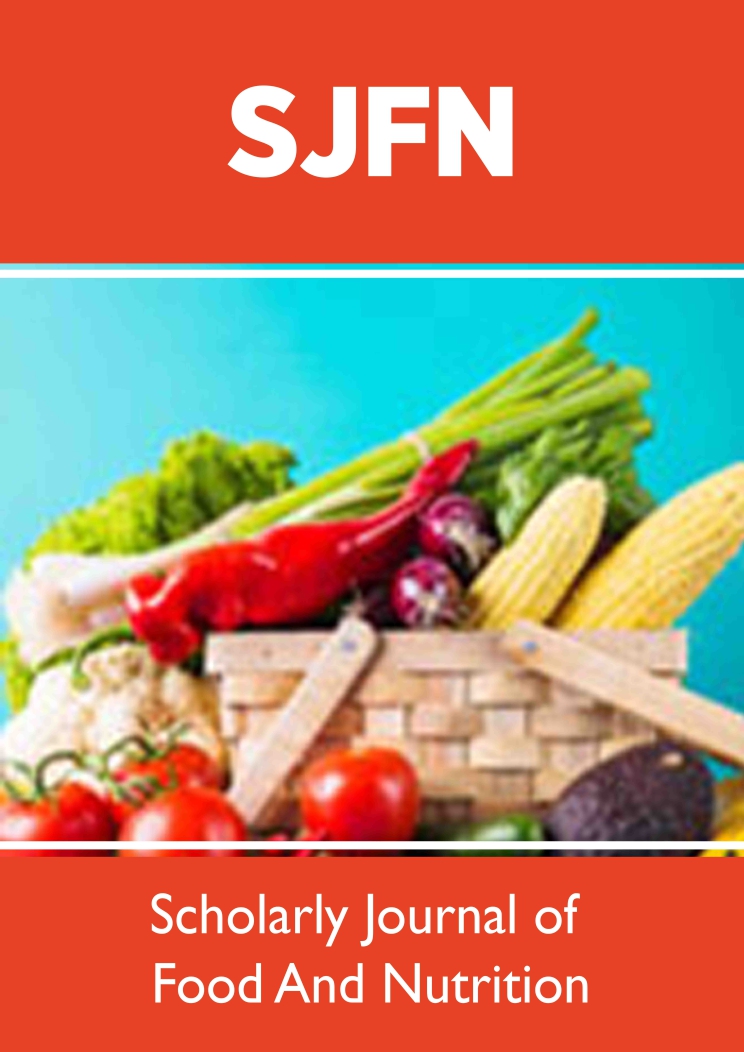
Lupine Publishers Group
Lupine Publishers
Menu
ISSN: 2638-6070
Research Article(ISSN: 2638-6070) 
Combination of Black Cumin Seed Oil and Astaxanthin Supports Gut-Immune-Brain-Axis and Improves Mood
Volume 4 - Issue 3Shawn M Talbott1,2* and Julie A Talbott2
- 1Amare Global, USA
- 2,3Waves Wellness, Plymouth, USA
Received: July 30, 2022 Published: August 11, 2022
*Corresponding author:Shawn M Talbott, Amare Global, 17872 Gillette Ave., Suite 100 Irvine, CA 92614, USA
DOI: 10.32474/SJFN.2022.04.000190
Abstract
This study evaluated the effects of dietary supplementation with a combination of black cumin seed oil and astaxanthin oleoresin on upper-respiratory tract complaints (URTCs) and psychological mood state. Thirty-two male (21) and female (11) runners consumed a soft gel oil blend (500mg of black cumin seed oil plus 8mg astaxanthin oleoresin) or a placebo daily during the 4-week supplementation period (3 weeks before and 1 week following a marathon or half-marathon competition). We collected subjective and objective measures before and after supplementation. Subjects completed the profile of mood state (POMS) psychological assessment and a health log questionnaire assessing health status and URTCs (subjective measures), as well as provided saliva samples and fecal samples for measurement of cortisol and microbiome balance, respectively (objective measures). Subjects in the supplementation group (black seed/astaxanthin blend) reported significantly fewer URTCs and better overall well-being, as well as lower cortisol and superior microbiome indices, compared to placebo. These results suggest that the combination of black cumin seed oil plus astaxanthin oleoresin may improve immune system vigilance and overall well-being following the stress of endurance training and competition, possibly via improvements in the microbiome and Gut-Immune-Brain-Axis.
Introduction
The immune system is traditionally thought of as the body’s primary defense against external pathogens such as viruses. Increasingly, research is demonstrating an expanded role of the immune system as both a “shield” against viruses and also as a “communication organ” via its contribution to psychological mood state and overall well-being. Numerous studies have shown the close links between psychological factors such as stress, sleep deprivation, and immune suppression leading to poor vaccine responses and increased upper-respiratory tract infections (URTIs) and non-infection upper-respiratory tract complaints (URTCs) such as chest heaviness, cough, dry/sore throat, etc. Athletes in particular, because of the mental and physical stress of their heavy exercise and intense training regimen, tend to have increased susceptibility to URTI and URTC [1-4]. Exercise has been demonstrated both a physical and psychological stressor that can have significant neg ative impacts on immune system components such as neutrophils, natural killer cells, T cells and B cells [5-7]. The one-to-two-week period following intense endurance competition represents a period of particularly elevated susceptibility, during which athletes often present with a range of upper-respiratory tract complaints (URTC), such as cough, stuffy nose, sore throat, headaches, and others. These complaints may be related to temporary elevations in hormones such as cortisol and inflammatory cytokines that coordinate the stress response [8-9]. The chronic impact of continuous heavy endurance training (without adequate recovery) may be categorized as overtraining or overreaching syndrome and eventually athlete burnout, which is characterized by a weakened immune system, increased risk of URTIs/URTCs, and negative outcomes for psychological mood state (e.g. higher stress, poor sleep quality, increased risk for depression, among others).
Like psychological stress, exercise stress is known to suppress immune system vigilance and increase susceptibility to many disease states, including URTIs/URTCs [10]. Habitual exercise is widely regarded as a buffer against many detrimental health effects of stress, but chronic overload (in the absence of adequate recovery), which can be common in motivated recreational athletes building up for an endurance competition such as a half-marathon or marathon, can also lead to psychological stress and deteriorations in mood state [11]. Individual ability to cope with daily stressors is known to influence the immune response to exercise, with overstress associated with reductions in immune cell populations, lowered antibody production and altered cytokine response [12-13].
A wide range of dietary supplements have shown varying levels of effectiveness in balancing the relationship between exercise stress and immune vigilance. For example, various vitamins and minerals (C, D, zinc), yeast beta-glucans, and mushroom alpha-glucans have shown promising benefits in endurance runners [14-22] via their ability to enhance the innate immune response, helping to prime immune system function during and following various forms of chronic stress. Black cumin seed (Nigella sativa) is one of the most revered herbal medicines in Middle Eastern and Ayurvedic traditional medicine, where it has been found buried with Egyptian pharaohs to aid in the afterlife journey and mentioned in the Bible and the Koran where it is referred to as “the blessing seed created by God” to relieve difficult medical conditions. Research on black cumin seed oil has spanned preclinical, animal, and human clinical studies, with many of the therapeutic properties of the plant attributed to its essential oil constituent, thymoquinone (TQ), which may have anti-inflammatory and immunomodulatory effects on macrophages, lymphocytes, macrophages, natural killer (NK) cells, and a variety of immune-related cytokines (IFN, IL-2, TNF-alpha, IL-6, and others).
Natural microalgae-derived astaxanthin (a dark red carotenoid from Haematococcus pluvialis) has been clinically evaluated for its antioxidant, anti-inflammatory, cardioprotective, neuroprotective, and immune-modulatory activities, while pre-clinical studies have further shown astaxanthin to modulate cellular stress pathways, including nuclear factor kB (NFkB), nuclear factor E2 related factor 2 (Nrf2), and nitric oxide [23]. In addition to the implication of cellular stress pathways in various neurological disorders including Alzheimer’s, Parkinson’s, and age-related dementia, astaxanthin may also play a role in psychological mood states (e.g. depression and anxiety) through its involvement in neurotransmitter balance, including within the serotonergic system [24]. Previous studies of astaxanthin supplementation have shown a variety of physical and psychological benefits, including attenuation of exercise-induced muscle damage, delayed physical exhaustion, improved endurance performance, and elevated immunoglobulin levels – as well as anti- depressive, anti-anxiety, and mood-balancing effects [23-25]. Recently, natural astaxanthin supplementation was shown to support the psychophysiological “Heart-Brain-Axis” with simultaneous improvements in both physical performance and mental wellness – suggesting a potential ergogenic aid for endurance athletes (e.g. marathon runners, triathletes, cyclists, etc), where both physiological endurance and psychological balance are simultaneously stressed and where support of both may be a novel approach to improving physical/mental performance [25].
Stress-related immune alterations, including dysbiosis at the level of the gut microbiome, can represent significant and meaningful challenges for not only the exercise performance of athletes, but also their overall health and well-being. In this study, we used the “exercise stress” of endurance running (training and competition) to activate the athlete’s stress response system (cortisol) and both challenge gut microbiome resilience and temporarily suppress immune vigilance and psychological mood state. We have used this exercise stress model in a number of previous investigations of immune system function and mood state [8] – and apply it here to elucidate the potential benefits of black cumin seed oil and astaxanthin oleoresin in supporting the Gut-Immune-Axis.
Materials and Methods
This study was done in accordance with the Helsinki Declaration, for clinical research involving human subjects and was reviewed and approved by an external advisory board (WCG-IRB, Puyallup, WA; Protocol #20202070). The objective of this study was to investigate the effects of dietary supplementation for onemonth with a combination of black seed and astaxanthin oils. Our hypothesis was that this oil combination may be immunomodulatory for improving immune system vigilance and psychological stress. We recruited 40 healthy volunteers to receive the Supplement (oil blend) or a Placebo (maltodextrin). The supplement provided 500mg of black cumin seed oil as ThymoQuin (Nigella sativa, 3% thymoquinone, TriNutra, Israel) and 8mg of microalgae-derived astaxanthin oleoresin as AstaPure (Haematococcus pluvialis, AlgaTech, Israel).
Subjects
We recruited healthy, fit, recreational runners who were experienced in training and competing for half-marathon to marathon- distance events. Our subject pool completing all phases of baseline pre-supplementation measurements, training, competition, and final post-supplementation measurements included 32 subjects (Table 1). Four subjects in the Supplement group and four subjects in the Placebo group were lost to follow up (did not complete all measures). There were no adverse events reported for either group.
Health Log
Subjects completed a physical health questionnaire [8] at baseline (pre-supplementation) and 4-weeks (post-supplementation). The health log was a daily health perception log containing questions related to overall health status and specific upper-respiratory tract complaints (URTCs). The URTC-related symptoms measured included nasal congestion, runny nose, sore throat, sneezing, cough, fatigue, headache, general malaise and body aches. Reported symptoms were totaled for each assessment period.
Mood Assessment
Changes in psychological mood state were assessed using the research-validated Profile of Mood States (POMS) questionnaire to measure 6 primary psychological factors (tension, depression, anger, fatigue, vigor, and confusion) plus the combined global mood state as an indication of subjective well-being. The POMS methodology has been used in ~3,000 studies, and its validity is well established [26]. The POMS profile uses 65 adjective-based intensity scales scored on a 0–4 hedonic scale (e.g. “not at all” to “extremely”). The 65 adjective responses are categorized into the 6 mood factors (tension, depression, anger, fatigue, vigor, or confusion), tabulated, scored, and analyzed. The output of the POMS questionnaire is an assessment of the positive and negative moods of each subject at baseline and post-supplementation.
Salivary Cortisol
Cortisol is the major glucocorticosteroid stress hormone produced in the adrenal cortex and is actively involved in regulating many aspects of metabolism related to sports performance, including blood pressure, anti-inflammatory function, gluconeogenesis, and immune function. Cortisol production has a circadian rhythm, with peak levels in the early morning and nadir levels at night during deep sleep. Levels rise independently of circadian rhythm in response to stress. Salivary cortisol represents a simple and accurate method for assessing unbound active cortisol levels as an index of overall stress exposure. Each subject provided “first morning” saliva samples (upon awakening) for analysis of free cortisol at baseline (pre-supplementation) and 4-weeks (post-supplementation).
Microbiome Assessment
Volunteers were provided with a take-home kit to obtain fecal samples in the privacy of their home for analysis. The kit included detailed instructions and postage paid packaging for return directly to the lab. Each kit was numerically coded so that samples were blinded to the lab. Microbiome analysis of fecal samples was carried out using the complete Biome Tracker system (Wasatch Scientific, Murray, UT). Briefly, fecal samples were obtained by nylon swab and placed into preservative binding buffer to lock the composition of bacteria in place. DNA was then purified using DNA columns and ~20ng of DNA from each sample was added to the reaction mixtures. Samples were processed on an ABI 7500 Fast (Applied Biosystems) instrument in duplicate. A “microbiome composite score” was generated as an overall average of many different aspects of microbiome balance, including Bifidobacterium, Lactobacillus, Akkermansia, S. Thermophilus, Firmicutes/Bacteroidetes (F/B) ratio, and others.
Data Management and Analysis
All questionnaires were hand-delivered or mailed to a central location and transcribed to a central database. Subjects who did not complete the questionnaires or who submitted incomplete questionnaires were dropped from the study and not included in the study analysis (8 subjects; 4 from the Supplement group and 4 from the Placebo group). Data were identified by subject number and examined for accuracy and completeness. Tabulated data were analyzed with JMP 14.0 (JMP Statistical Discovery, Cary, NC) using standard parametric paired t tests, and significance was assessed with a 2-tailed alpha level set at 0.05. Data are presented as average values for each group (Placebo and Supplement) before and after supplementation.
Results
Following 4 weeks of supplementation with the black cumin seed/astaxanthin oil blend, (3 weeks before and 1 week following an intense endurance run), we observed the following differences between the Supplement and Placebo groups:
Subjective Measures
As expected, both groups reported a dramatically greater number of self-reported upper-respiratory tract complaints (URTCs) following the endurance run compared with before (Figure 1). However, the total number of URTC symptoms reported such as cough, sore throat, sniffles, stuffiness, etc., were 78% lower in the Supplement group compared to Placebo (Figure 1). There was no significant change in Global Mood State (e.g. “overall well-being”), following the endurance run in the Placebo group (Figure 2), while the Supplement group demonstrated an 11% improvement (a lower number indicates a less negative psychological mood state – and thus a better overall well-being index).
Figure 1: Subjects in the Supplement group had significantly fewer self-reported upper respiratory tract complaints (URTCs) compared to Placebo. (*significantly different from post-supplementation placebo value, p<0.05).
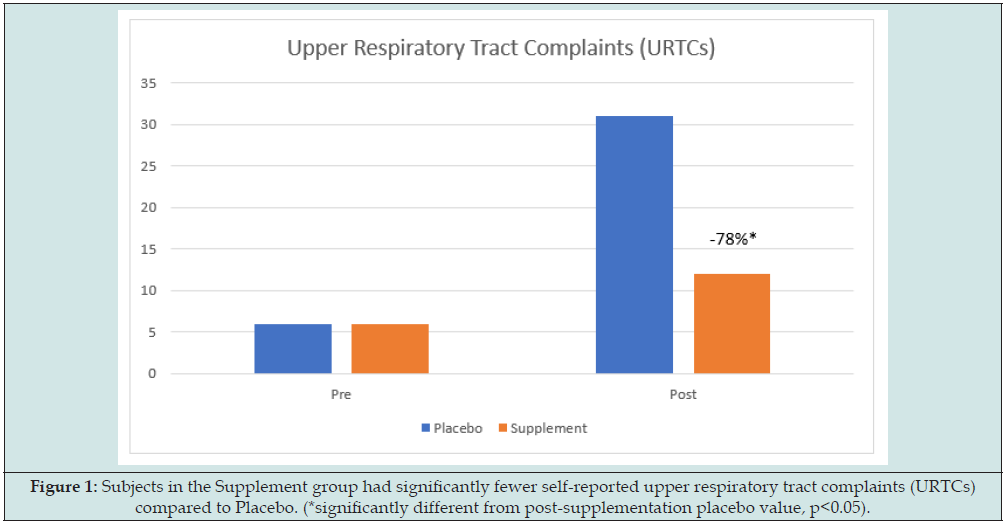
Figure 2: Subjects in the Supplement group had significantly better Global Mood State compared to Placebo (lower score indicates higher well-being index). (*significantly different from post-supplementation placebo value, p<0.05).
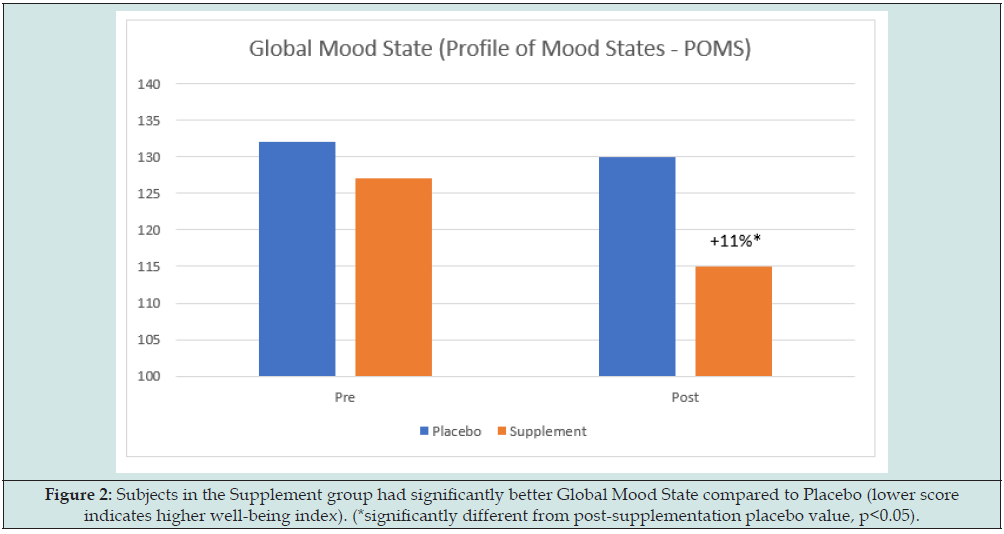
Figure 3: Subjects in the Supplement group had significantly higher relative abundance of Streptococcus thermophilus bacteria compared to Placebo. (*significantly different from post-supplementation placebo value, p<0.05).
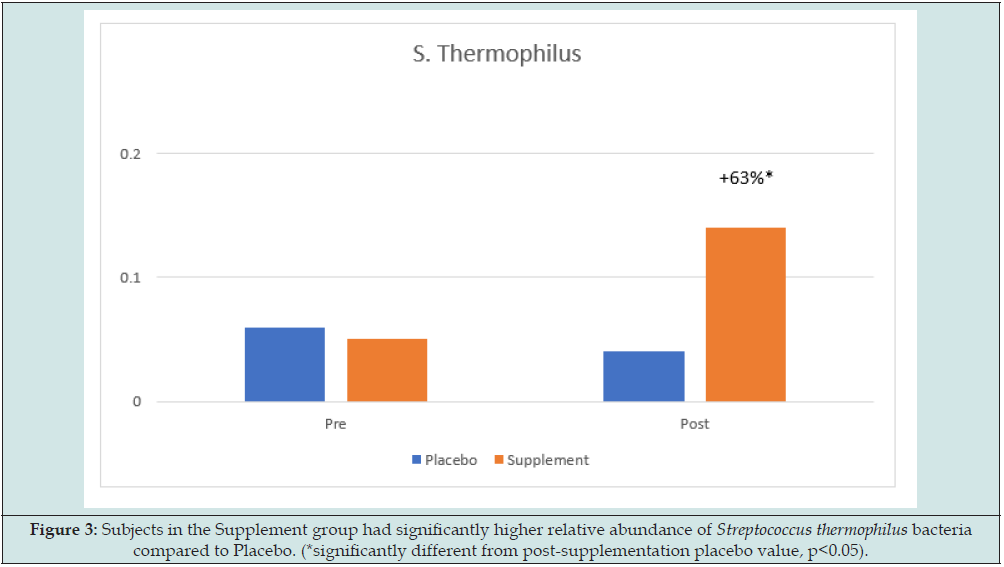
Objective Measures
There was no significant difference in overall microbiome indices following the endurance run. However, following supplementation, Streptococcus thermophilus values were 63% higher in the Supplement group, suggesting improved immune system regulation (Figure 3). Cortisol, the primary stress hormone related to both mood and immune function, was slightly but not significantly elevated in the Placebo group following the endurance run, but was 20% lower in the Supplement group post-supplementation compared to Placebo (Figure 4).
Figure 4: Subjects in the Supplement group had significantly lower Salivary Cortisol (ng//ml) compared to Placebo. (*significantly different from post-supplementation placebo value, p<0.05).
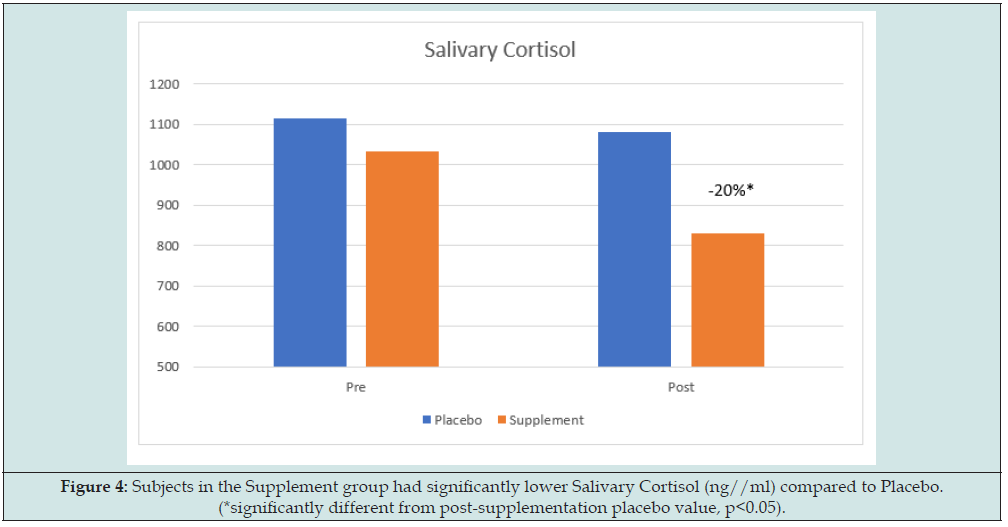
Discussion
These results demonstrate a significant and meaningful benefit of supplementation with a combination of black cumin seed oil plus astaxanthin oleoresin for the immune system as both a “shield” (protection from upper-respiratory complaints) and as a “communication organ” (signaling well-being between body and mind and resulting in superior psychological mood state). This linkage between body and mind across the “Gut-Immune-Axis” [27] involves many aspects of a coordinated and interconnected communication system linking the gut microbiome (S. thermophilus) to the brain (psychological mood state) across the axis (immune and stress response pathways). When the entire system is balanced, as evidenced here in the Supplement group, there is a noticeable benefit for physical health and mental wellness. In order to “stress and suppress” the immune system of volunteers in our study, participants trained for and completed a strenuous endurance running event (half-marathon to marathon distance) to induce both physical and mental stress, as well as to create a temporary one-to-two week “susceptibility window” whereby a higher risk for upper-respiratory tract complaints (URTCs) is more likely to be observed following intense endurance competition. Our hypothesis was that the group supplementing with the blend of black seed/astaxanthin as a natural immune modulator would demonstrate fewer URTC symptoms and lower indices of mental/physical stress.
Rather than being an “immune-booster” to stimulate immune system activity, both black cumin seed oil and astaxanthin may be considered as natural “immune-modulators” that can help to balance overall immune system activity. Such natural substances represent an emerging approach to immunotherapy that either elevates a suppressed immune system “up” to optimal – or calms an over-activated immune system “down” to optimal. We refer to this paradigm as “priming” the immune system – a concept that is analogous to how traditional medicine practitioners and herbalists often refer to the balancing “adaptogenic” effect of certain plants such as ashwagandha, shatavari, cordyceps, and rhodiola (collectively referred to as “adaptogens” for their ability to help the body/mind adapt to stressful conditions). In this fashion, properly primed immune system “pays attention” better to factors that it should fight (e.g. viruses, bacteria, cancer cells, etc), while “ignoring” factors that should be considered non-harmful (e.g. pollen, mucus membranes, joint cartilage, etc).
The majority of both the microbiome and the immune system reside in the gut – forming a symbiotic relationship and ensuring that the human body is protected from harmful pathogens entering the body via the gut from ingested foods and liquids. Over time, our immune system shapes the diversity of our microbiome, and our gut influences the development and vigilance of our immune system. For example, the gut microbiome acts as a gatekeeper, and a trainer, and increasingly as a communication organ – educating immune cells and orchestrating overall immune system function. In addition, the gut microbiome interacts with the brain in multi-directional ways that involve the immune system using neural, inflammatory, and hormonal signaling pathways [27]. These immune-mediated signals from gut to brain have been implicated in many aspects of mental health and well-being, including depression, anxiety, stress reactivity, and overall psychological mood states [27].
In this study, we report the effect of supplementing with a combination of black seed oil plus astaxanthin oleoresin for 4 weeks on the physical and psychological well-being of long-distance runners. The current study employed a series of subjective self-assessment questionnaires that addressed overall health status and URTCs. In addition to our evaluation of subjects for physical health, a psychological assessment known as the Profile of Mood States (POMS) was conducted to assess overall mood state. We also collected objective markers of microbiome balance (Streptococcus thermophilus) and stress hormones (salivary cortisol), both of which are associated with immune system vigilance and psychological stress response, and which may represent a possible mechanism by which immune function and psychological mood state are related.
During the course of the 4-week treatment period (3 weeks before and 1 week after an intense endurance run), subjects in the Supplement group reported fewer URTCs, better overall health and a more positive mood state compared to Placebo. In addition, supplemented runners also showed higher levels of Streptococcus thermophilus (S. thermophilus) and lower stress hormone exposure (cortisol) – both of which are objective markers related to stress response, immune vigilance and psychological mood state across the Gut-Immune-Brain-Axis. Runners and other athletes, whose athletic activities cause significant levels of both physical and mental stress, are more susceptible to URTI (infections) and URTC (complaints). Previous research has reported that athletes training for a marathon experience a deterioration in global mood state [1, 2, 4-7, 10, 11, 13, 27], and a number of studies have reported that nutritional supplementation can modulate their health status [5, 8, 9, 14-22].
Physical and psychological factors of subjects undergoing stressful situations are reported to increase URTI and URTC [12- 13]. In all cases, the subjects supplemented with the black seed/ fish oil combination experienced better physical health and improved psychological status (Global Mood State), than those in the placebo group. Supplemented subjects reported both fewer URTC symptoms and a better overall health status. The URTC symptoms reported by subjects are typical of cold and flu symptoms, and analogous to symptoms reported in other studies [5, 12-13]. The POMS assessment for psychological health strongly supported and mirrored the physical health assessment. Illness and stress impact the immune system in both physical and psychological ways [13, 26]. The POMS methodology has been used in more than 3,000 studies [26]; thus it has well-established validity and is sensitive to changes in psychological states pre/post-intervention – particularly in assessing the overall global mood state of subjects – analogous to a measurement of overall well-being and mental resilience.
Previous work has shown benefits of a range of dietary supplements may help reduce upper-respiratory symptoms in athletes [5, 8, 9, 14-22], i.e., beta-glucans reduced URTCs and improved psychological mood state; zinc treatment reduced duration and severity of cold symptoms; probiotics (Lactobacillus fermentum) reduced the severity and duration of URTI in athletes; and vitamin C supplementation reduced the duration and severity of URTI in ultramarathoners.
Conclusion
In this study, the combination of black cumin seed oil plus astaxanthin oleoresin significantly decreased upper-respiratory tract complaints (URTCs) and improved psychological mood state (global well-being) following intense endurance training and competition. These findings support a strong link for physical and mental benefits of the oil blend following the stress of endurance exercise. Additionally, subjects in the Supplement group had lower cortisol and superior microbiome parameters, suggesting that immune vigilance and mental well-being is linked through the microbiome and stress response pathways (e.g. the “Gut-Immune-Brain-Axis”). These results add to the growing scientific literature and natural armamentarium for immune-modulation to both reduce upper-respiratory symptoms and improve psychological mood state in “stressed” individuals (endurance athletes in this study).
Conflicts of Interest and Funding Statement
This study was funded by TriNutra, which manufactures and sells Thymo Quin black cumin seed oil and Algatech, which manufactures and sells Asta Pure astaxanthin supplements. The study was designed and conducted by 3Waves Wellness, which was compensated to carry out the trial. ST is an employee of Amare Global, which sells dietary supplements that include black cumin seed oil and astaxanthin oleoresin. ST and JT are owners of 3Waves Wellness, an independent research organization.
References
- Nieman DC, Johanssen LM, Lee JW, Arabatzis K (1990) Infectious episodes in runners before and after the Los Angeles Marathon. Journal of Sports Medicine and Physical Fitness 30(3): 316-328.
- Peters EM, Bateman ED (1983) Ultramarathon running and upper respiratory tract infections. An epidemiological survey, South African Medical Journal 64(15): 582-584.
- Konig D, Grathwohl D, Weinstock C, Northoff H, Berg A (2000) Upper respiratory tract infection in athletes: Influence of lifestyle, type of sport, training effort, and immunostimulant intake. Exercise Immunology Review 6: 102-120.
- Spence L, Brown WJ, Pyne DB, Nissen MD, Sloots TP, et al. (2007) Incidence, etiology, and symptomatology of upper respiratory illness in elite athletes. Medicine and Science in Sports Exercise 39(4): 577-586.
- Mackinnon LT, Hooper S (1994) Mucosal (secretory) immune system responses to exercise of varying intensity and during overtraining. International Journal of Sports Medicine 15: 179-183.
- Nieman DC, Simandle S, Henson DA, Warren BJ, Suttles J, et al. (1995) Lymphocyte proliferative response to 2.5 hours of running. International Journal of Sports Medicine 16(6): 404-409.
- Ostrowski K, Hermann C, Bangash A, Schjerling P, Nielsen JN, et al. (1998) A trauma-like elevation of plasma cytokines in humans in response to treadmill running. Journal of Physiology 513: 889-894.
- Talbott SM, Talbott JA (2009) Effect of Beta-1,3/1,6 Glucan on upper respiratory tract infection symptoms and mood state in marathon athletes. Journal of Sports Science and Medicine 8(4): 509-515.
- Peters EM, Goetzsche JM, Grobbelaar B, Noakes TD (1993) Vitamin C supplementation reduces the incidence of postrace symptoms of upper-respiratory-tract infection in ultramarathon runners. American Journal of Clinical Nutrition 57(2): 170-174.
- Mackinnon LT (1997) Immunity in athletes. International Journal of Sports Medicine 18(suppl 1): 62-68.
- Strasner A, Barlow C, Kampert J, Dunn A (2001) Impact of physical activity on URTI symptoms in Project PRIME participants. Medicine and Science in Sports Exercise 33(5): 301.
- Cohen S, Doyle WJ, Skoner DP (1999) Psychological stress, cytokine production, and severity of upper respiratory illness. Psychosomatic Medicine 61(2): 175-180.
- Hassmen P, Blomstrand E (1991) Mood change and marathon running: A pilot study using a Swedish version of the POMS test. Scandinavian Journal of Psychology 32(3): 225-232.
- Akerstrom TC, Pedersen BK (2007) Strategies to enhance immune function for marathon runners: What can be done? Sports Medicine 37(4-5): 416-419.
- Babineau TJ, Hackford A, Kenler A, Bistrian B, Forse RA, et al. (1994a) A phase II multicenter, double-blind, randomized, placebo-controlled study of three dosages of an immunomodulator (PGG-glucan) in high-risk surgical patients. Archives of Surgery 129(11): 1204-1210.
- Babineau TJ, Marcello P, Swails W, Kenler A, Bistrian B, et al. (1994b) Randomized phase I/II trial of a macro- phage-specific immunomodulator (PGG-glucan) in high-risk surgical patients. Annals of Surgery 220(5): 601-609.
- Bedirli A, Kerem M, Pasaoglu H, Akyurek N, Tezcaner T, et al. (2007) Beta-glucan attenuates inflammatory cytokine release and prevents acute lung injury in an experimental model of sepsis. Shock 27(4): 397-401.
- Cox AJ, Pyne DB, Saunders PU, Fricker PA (2008) Oral administration of the probiotic Lactobacillus fermentum VRI- 003 and mucosal immunity in endurance athletes. British Journal of Sports Medicine 44(4): 222-226.
- Davis JM, Murphy EA, Brown AS, Carmichael MD, Ghaffar A, et al. (2004) Effects of oat beta-glucan on innate immunity and infection after exercise stress. Medicine and Science in Sports and Exercise 36(8): 1321-1327.
- Kekkonen RA, Vasankari TJ, Vuorimaa T, Haahtela T, Julkunen I, et al. (2007) The effect of probiotics on respiratory infections and gastrointestinal symptoms during training in marathon runners. International Journal of Sport Nutrition and Exercise Metabolism 17(4): 352-363.
- Nieman DC, Henson DA, McMahon M, Wrieden JL, Davis JM, et al. (2008) Beta-glucan, immune function, and upper respiratory tract infections in athletes. Medicine and Science in Sports and Exercise 40(8): 1463-1471.
- Prasad AS, Fitzgerald JT, Bao B, Beck FW, Chandrasekar PH (2000) Duration of symptoms and plasma cytokine levels in patients with the common cold treated with zinc acetate. A randomized, double-blind, placebo-controlled trial. Annals of Internal Medicine 133(4): 245-252.
- Park JS, Chyun JH, Kim YK, Line LL, Chew BP (2010) Astaxanthin decreased oxidative stress and inflammation and enhanced immune response in humans. Nutr Metab (Lond). 7: 18.
- Jiang X, Keqi Zhu, Quanyi Xu, Guokang Wang, Jiajia Zhang, et al. (2017) The antidepressant-like effect of trans-astaxanthin involves the serotonergic system. Oncotarget 8(15): 25552-25563.
- Talbott S, Hantla D, Capelli B, Ding L, Li Y, Artaria C (2019) Effect of Astaxanthin supplementation on psychophysiological heart-brain axis dynamics in healthy subjects. Functional Foods in Health and Disease 9(8): 521-531
- McNair D, Heuchert J, Shilony E (2003) Profile of mood states bibliography 1964-2002.
- Margolis KG, Cryan JF, Mayer EA (2021) The Microbiota-Gut-Brain Axis: From Motility to Mood. Gastroenterology 160(5): 1486-1501.s

Top Editors
-

Mark E Smith
Bio chemistry
University of Texas Medical Branch, USA -

Lawrence A Presley
Department of Criminal Justice
Liberty University, USA -

Thomas W Miller
Department of Psychiatry
University of Kentucky, USA -

Gjumrakch Aliev
Department of Medicine
Gally International Biomedical Research & Consulting LLC, USA -

Christopher Bryant
Department of Urbanisation and Agricultural
Montreal university, USA -

Robert William Frare
Oral & Maxillofacial Pathology
New York University, USA -

Rudolph Modesto Navari
Gastroenterology and Hepatology
University of Alabama, UK -

Andrew Hague
Department of Medicine
Universities of Bradford, UK -

George Gregory Buttigieg
Maltese College of Obstetrics and Gynaecology, Europe -

Chen-Hsiung Yeh
Oncology
Circulogene Theranostics, England -
.png)
Emilio Bucio-Carrillo
Radiation Chemistry
National University of Mexico, USA -
.jpg)
Casey J Grenier
Analytical Chemistry
Wentworth Institute of Technology, USA -
Hany Atalah
Minimally Invasive Surgery
Mercer University school of Medicine, USA -

Abu-Hussein Muhamad
Pediatric Dentistry
University of Athens , Greece

The annual scholar awards from Lupine Publishers honor a selected number Read More...





